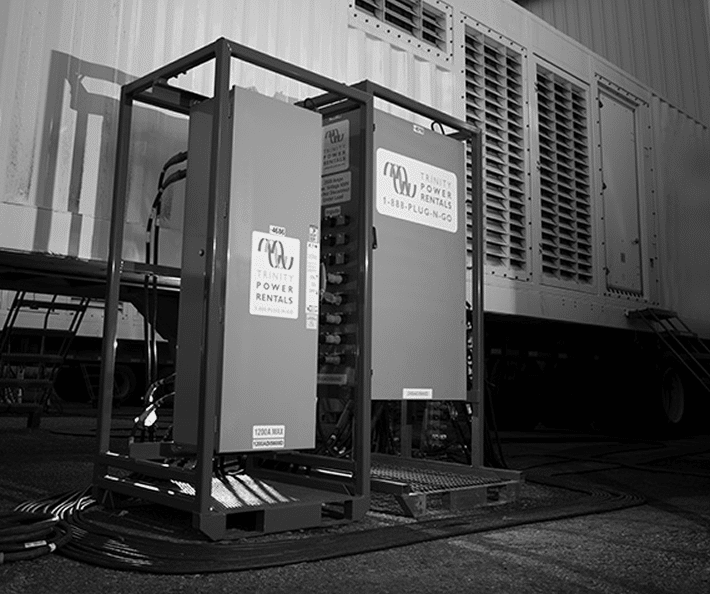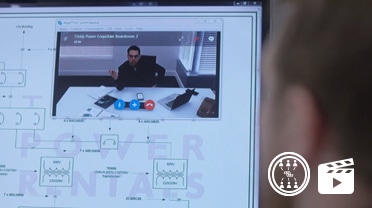- OUR APPROACH
-
COMMITTED TO YOUR SUCCESS
Our approach, developed over decades of experience, is fine-tuned to get the results you want.
We deliver concept-to-completion solutions, designed by temporary power specialists with access to the largest inventory of high-quality power generation and distribution equipment in North America.
-
- Equipment
-
RENTALS
From a wide range of diesel and natural gas generators to transformers, cable, light towers and more, our large rental fleet and extensive vendor network ensure we’ll have the temporary power equipment that your project requires — every time.

-
- Industries
-
INDUSTRIES WE SERVE
For nearly 20 years, we have been at work powering projects across Canada’s industrial sectors.
Select from this sampling of industries to learn how we can put our expertise to work for you.
VIEW ALL- Projects
- About
-
A PROUD HISTORY. A BRIGHT FUTURE.
From our inception in 1998, we have been building our team on a foundation of excellence. Our team members’ passion, expertise and commitment are what have allowed us to grow into a national company with projects across Canada.
Click on the links to learn more about our history, our team or our career opportunities.
- Blog
- Contact
-
How to Win Electrical Contracting Projects With Canada’s Top General Contractors
Aug 28, 2019
With large, multi-faceted projects to orchestrate, including ever-evolving electrical needs, General Contracting companies represent a wealth of opportunity for Electrical Contractors.
But winning the bid is rarely as simple as raising your hand.
John F. Wiesel is the president of Suderman Electrical Estimating Inc. – a Canadian company that offers estimating courses for the electrical industry. With 45 years in the industry, he has decades of experience breaking into new markets and winning major projects. A highly qualified international construction consultant, John has taught the skill of good estimating to over 3,500 contractors across Canada.
We spoke with him about what Electrical Contractors need to do to win lucrative bids with reputable mid- to large-sized General Contractors. The catch? It takes a lot more than an attractive bid to win good jobs consistently.
Build Connections: Get to Know Your Target Contractors
According to John, the best way to work towards winning bids is to build connections with the GCs you want to work with. “The big thing is – go see them,” says John. “Don’t just talk to them over the phone. Don’t just send them emails. That way, they don’t just have a price, they have a face. They know the company, they know you’re going to be there.”
He also recommends getting to know not just the contractor, but their clients as well. “Don’t just throw your price at the general,” says John, “go visit the developer too, see if you can work with them. Do maintenance on their buildings and that sort of thing, so they get to know you.”
Along with building relationships, it’s important to be building your reputation with a general contractor as well. That’s why Mr. Wiesel believes in the importance of taking small jobs first.
“You’re not going to get a big job with a big general out of the blue ,” he says. “You have to build up a reputation as a good contractor, and the only way you can do that is by getting work. That’s why I say get small jobs. Don’t go for the big jobs first.”
While John acknowledges that this is an unpopular opinion, he sees advantages to doing this that go beyond getting a foot in the door: “There are bad generals,” he explains. “If you get a big job with a general that’s not good, or not honest, or doesn’t run his jobs properly, you’re going to lose your shirt. So if you take a few small jobs first and you see that they’re poorly run, you’re not going to quote that guy the same anymore — if you quote him at all.”
Price Accurately: Estimating Can Make or Break You
There is a destructive mindset that John says he has only encountered in the electrical industry. “Electrical Contractors think, if that company can do that job for that price, we can do it lower because we are better,” he explains. “It’s not this way with plumbers or millwrights or carpenters or anybody else. And that’s North America wide.”
John believes that lowballing can be detrimental to an EC’s reputation and their business. “You don’t want to lowball a job because then you’re going to have to try to get extras to make money on it,” he says, “You lose your credibility.”
Not only will bidding low hurt your credibility, it can impact your bottom line as well. “If you start a job and you’re too low, those are the jobs that seem to just keep going down the drain,” says John. “You put your good guys on them to try to make them even break even. And in the meantime, you’ve got your not-so-good guys on the good jobs, and they’re not making money either. So you don’t want to take a job at a low price, because we’ve found out over the years, usually that hurts in the end.”
While the drawbacks of bidding low are obvious, it might be tempting to think that an honest estimate would never be competitive in the current market. John can empathize. “Today’s market’s pretty tough,” he says. “You’ve basically got to cut down on your markup and your profit. Then to make a markup and a profit on a job, you have to run the job better. Buy better, organize better.”
In order to win bids with an honest estimate, John also recommends finding a niche. “Depending on the market, in bad times we got 5% of the work we quoted,” he says of a company he previously worked for. “When we got into the automotive business, and we got into a niche, we got 30% of the work we quoted. And you can do that with generals too.”
Pay for Good People: You Get what you pay for
Part of generating a bid that will allow you to do the job well is hiring a good estimator.
“A good estimator has to properly labour it, get the proper pricing on material, and a proper markup to do the job,” says John. “They’re not making a guesstimate.”
But too many ECs, according to John, are paying bottom dollar for estimators, and they’re running into problems. “You’ve gotta pay an estimator a good wage because he’s the guy that gets the jobs. And if he makes mistakes, he’s not qualified, I’ve seen them – they miss half the stuff on the drawings, they don’t know how to labour it properly, and the company loses their shirt. So if you want a qualified person, you’ve gotta pay them a good wage.”
For John, that means at least a foreman’s wage: “People ask, ‘How much do you pay an estimator?’ You’ve got to pay them a project manager, minimum a foreman’s wage,” he says.
Get Educated: Estimating can be Learned
Estimating is more than an educated guess – it’s a skill that can be learned. That’s why Suderman offers several courses aimed at helping students develop those skills. Courses include a one-day introduction to electrical estimating, and two 2-day intensive courses. There is also a course designed specifically for lighting projects.
Courses cover everything from estimating fundamentals to pricing and labouring for various types of jobs.
Click here for a list of upcoming courses, and take your bids to the next level.
Related Articles
Subscribe for Access to Exclusive Content
Get insider updates, industry news, special equipment offers, and expert tips—directly to your inbox.
"*" indicates required fields




















